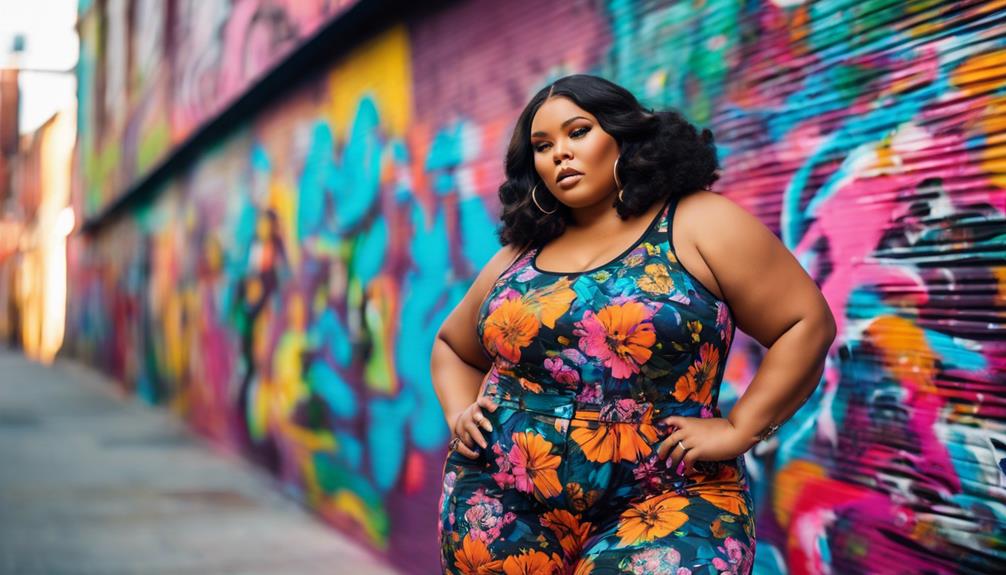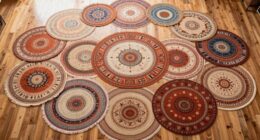Yes, Singaporeans are passionate about sustainable fashion! Approximately 36% actively purchase sustainable items, with younger generations—especially Gen Z and Millennials—taking the lead. However, challenges such as limited availability and misconceptions about costs prevent many from fully participating. Despite these obstacles, a growing awareness of the fashion industry’s environmental impact has led more consumers to seek out eco-friendly options. They are also becoming more critical of brands’ sustainability claims, demanding transparency and authenticity. If you are interested in learning more about how this trend is developing and its implications for the fashion industry, there is much more to explore!
Key Takeaways
- 36% of Singaporean consumers actively purchase sustainable fashion, highlighting a growing interest in eco-friendly options.
- Among younger generations, 40% of Gen Z and Millennials prioritize sustainable fashion compared to only 20% of Baby Boomers.
- Limited availability and perceived higher costs are significant barriers, with 68% of consumers facing challenges in finding sustainable options.
- There is a rising skepticism about sustainability claims; 51% of e-commerce products make vague environmental claims, prompting a demand for transparency.
Sustainable Fashion Purchase Rates
In Singapore, 36% of consumers are already embracing sustainable fashion by purchasing clothing, shoes, and accessories made with eco-friendly practices. This trend is especially pronounced among younger demographics, with 40% of Gen Z and Millennials opting for sustainable fashion purchases. You might be surprised to learn that this focus on environmental sustainability isn't just a passing phase; it reflects increasing consumer awareness regarding the impact of fashion on our planet.
As a Singaporean, you're part of a growing movement that prioritizes eco-friendly choices. Today's fashion brands are responding to your values by creating more sustainable options, ensuring that you can enjoy stylish clothing and accessories without compromising your commitment to the environment.
While the overall purchase rate is impressive, it's also significant that only 33% of Gen X and just 20% of Baby Boomers are engaging in sustainable fashion purchases. This generational gap highlights how younger consumers are leading the charge toward a more sustainable future.
Barriers to Sustainable Fashion
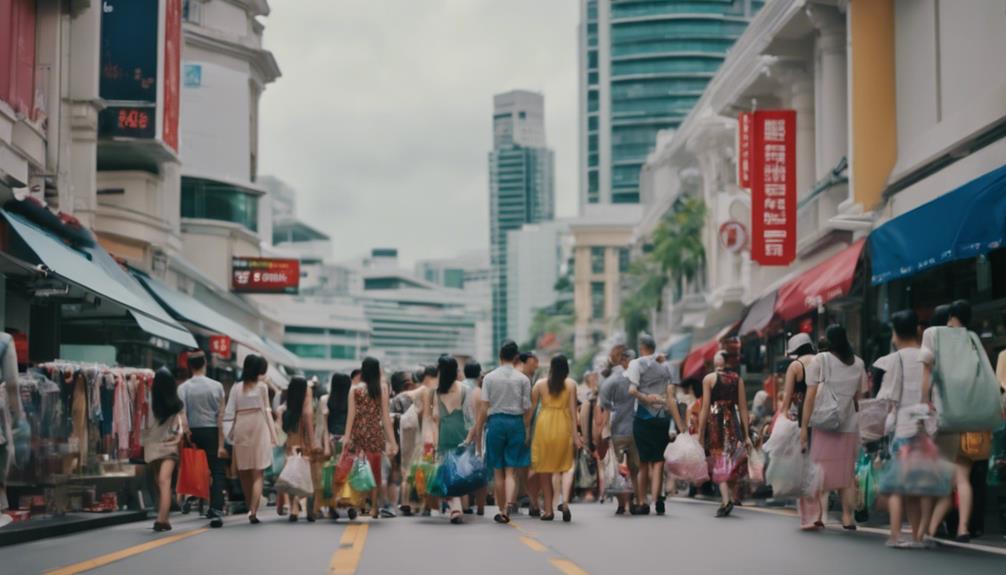
When you think about sustainable fashion in Singapore, you might notice some key barriers that get in the way.
Many of you struggle with finding these products due to limited availability, and the higher prices often discourage purchases.
These factors can make it tough to embrace a more sustainable wardrobe, even if you want to.
Availability Challenges Faced
Availability challenges are a major barrier for 68% of consumers in Singapore who want to embrace sustainable fashion but can't find enough local options. Many of you struggle with availability issues, limiting your purchasing choices and making it tough to support sustainable brands. This lack of accessibility is particularly frustrating for younger demographics like Gen Z and Millennials, who are enthusiastic to make eco-friendly fashion choices.
The limited presence of sustainable fashion in mainstream retail means that these brands often go unnoticed, further complicating your ability to shop sustainably. When you can't find local stores offering a variety of options, it becomes discouraging to pursue sustainable fashion.
However, there's hope. Increasing awareness and education about sustainable brands can help bridge this gap. By knowing where to find these options and understanding their value, you can make informed choices that align with your values.
Ultimately, addressing these availability challenges can empower you and fellow consumers to embrace sustainable fashion more fully. With greater access, you can contribute to a more sustainable future while enjoying the unique styles and ethical choices that come with it.
Perceived Higher Costs
Many consumers in Singapore hesitate to embrace sustainable fashion because they perceive these items as more expensive than conventional options. In fact, 56% of consumers believe sustainable fashion carries a higher price tag, which greatly hampers purchasing decisions. This perception is especially pronounced among older demographics, like Baby Boomers, with only 20% engaging in sustainable fashion purchases.
Several factors contribute to these perceived higher costs and barriers to adoption:
- Misconception of Pricing: Many assume sustainable items are always pricier, limiting their willingness to explore options.
- Affordability Concerns: With only 36% of consumers purchasing sustainable items, affordability remains a key issue.
- Limited Awareness: A lack of knowledge about the long-term savings from sustainable clothing can deter purchases.
Addressing these misconceptions about pricing could potentially encourage more consumers to reflect on sustainable fashion, expanding its adoption in Singapore.
Trust in Sustainability Claims

As a consumer, you might find yourself questioning the sustainability claims brands make, especially with so many vague assertions floating around.
Growing awareness of greenwashing is making you more discerning about what's genuinely eco-friendly.
Understanding these dynamics can empower you to make smarter choices in the fashion market.
Growing Skepticism Among Consumers
A significant portion of consumers in Singapore are questioning the authenticity of sustainability claims made by brands, fueled by a growing awareness of greenwashing practices. This skepticism is reshaping consumer attitudes, as many are increasingly demanding transparency from fashion brands. With 51% of products on e-commerce platforms making vague or unsubstantiated environmental claims, it's no wonder you're cautious about what you buy.
Here are some key points driving this skepticism:
- Greenwashing Awareness: Many consumers are now aware of deceptive marketing tactics that exaggerate sustainability efforts.
- Demographic Variance: Younger consumers tend to be more critical of sustainability claims, often scrutinizing the authenticity behind them.
- Purchasing Decisions: Increased skepticism influences your choices, as you prefer brands that provide credible and substantiated claims.
As Singaporeans become more discerning about sustainability claims, it's essential for brands to back up their assertions with genuine efforts and transparent practices. Your purchasing decisions can drive change in the fashion industry, encouraging brands to be more accountable.
Impact of Greenwashing Awareness
Consumer awareness of greenwashing greatly influences trust in sustainability claims, leading to heightened scrutiny of brands' practices and marketing strategies. With over half of products on e-commerce platforms in Singapore making vague or unsubstantiated environmental claims, it's no wonder that consumers are becoming more discerning. Younger consumers, in particular, are critical of fashion brands and demand transparency regarding their sustainability efforts.
As you navigate the world of eco-friendly fashion, you'll notice that awareness of greenwashing directly impacts your purchasing decisions. If a brand fails to provide clear evidence of its sustainability practices, you're likely to feel skeptical and may choose to shop elsewhere. This growing scrutiny highlights the need for clearer marketing and labeling regulations to help you distinguish genuine sustainable options from misleading claims.
Ultimately, trust in sustainability claims hinges on how transparently brands communicate their eco-friendly initiatives. As a consumer, your awareness and vigilance can drive change in the fashion industry, pushing brands to be more accountable and authentic in their sustainability efforts. By staying informed, you can make empowered choices that align with your values.
Environmental Awareness and Fashion
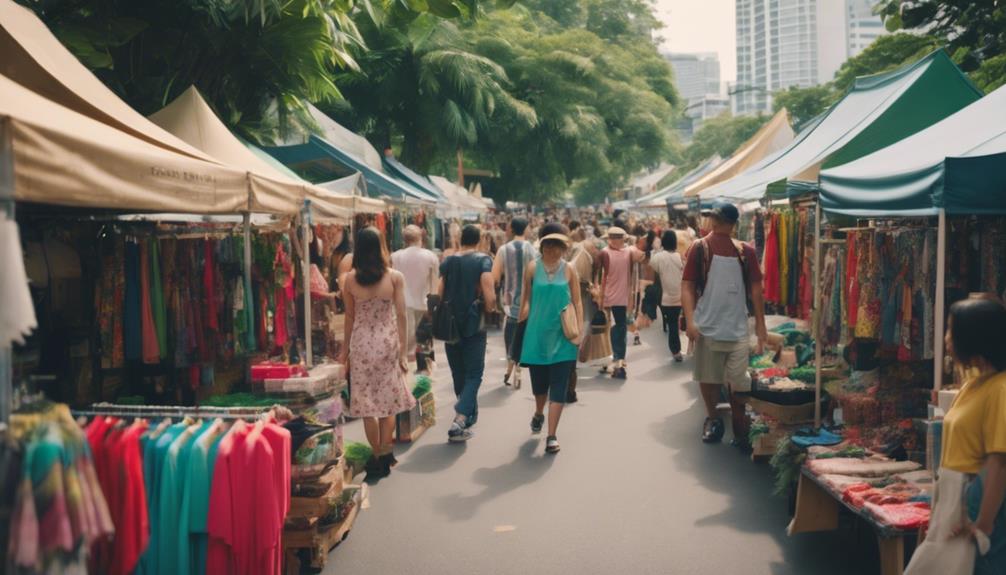
How aware are you of the fashion industry's impact on the environment, especially when it generates a staggering 92 million tons of textile waste each year? The awareness around sustainable fashion is growing, particularly among younger generations like Gen Z and Millennials, who prioritize environmental sustainability in their consumer behavior. In fact, 40% of these demographics actively seek out sustainable fashion products.
Here are some key points to reflect on:
- Environmental Impact: The fashion industry is the second largest global polluter, emphasizing the need for awareness.
- Consumer Engagement: 36% of Singaporean consumers have purchased sustainable fashion, reflecting a shift in mindset.
- Greenwashing Concerns: With 51% of products making vague environmental claims, transparency is essential for informed choices.
As awareness grows, so does the demand for transparency and genuine sustainable practices in the fashion industry.
Future Trends in Sustainable Fashion

As demand for sustainable fashion continues to grow, brands must innovate to meet consumer expectations for quality and affordability. With rising consumer awareness about eco-friendly options, it's essential for brands to address concerns regarding pricing and quality to encourage broader adoption of sustainable products.
Expect an increased focus on transparency in supply chains, as you and other consumers become more curious about the origins and production methods of your clothing. This transparency won't only enhance brand credibility but also build trust between consumers and brands committed to environmental sustainability.
Influencer collaborations are likely to play a significant role in shaping your choices. When trusted figures promote sustainable fashion, they can effectively encourage you to make eco-conscious decisions.
Additionally, potential policy changes may support sustainable fashion initiatives, further promoting eco-responsible practices within the industry.
Misconceptions About Sustainable Fashion

Many people in Singapore mistakenly think sustainable fashion is only about buying expensive new items, overlooking the value of re-wearing and repurposing what they already own. This misconception can hinder their engagement with sustainable practices.
Here are a few key points to reflect on:
- Mindful Consumption: Engaging creatively with your wardrobe can be just as impactful as purchasing new, eco-friendly options.
- Thrift Shopping: Buying secondhand clothing is a fantastic way to support sustainability while saving money.
- Local Ethical Brands: Supporting local brands can make a real difference, as they often prioritize ethical production methods over mass-produced items.
Changing Shopping Habits
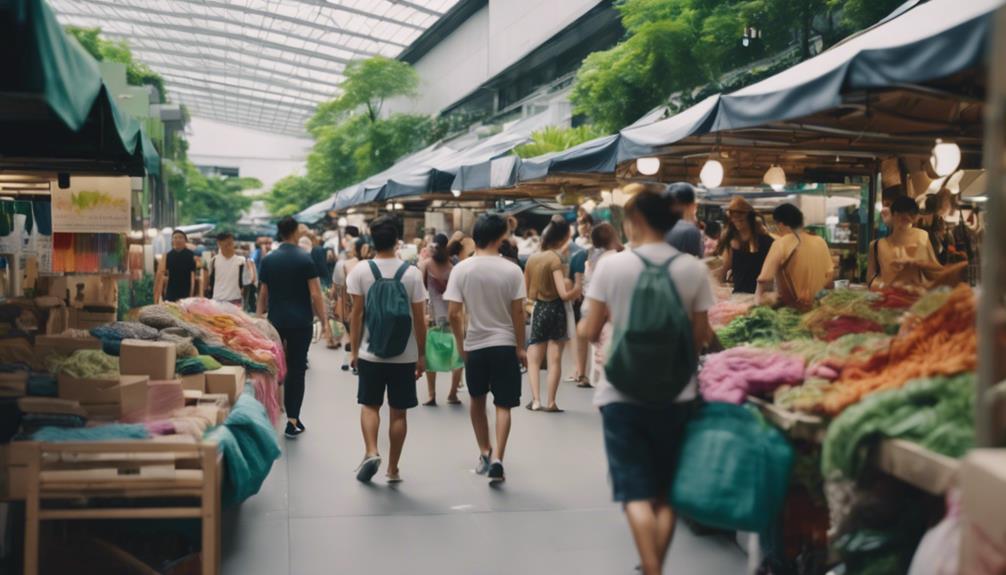
Recent trends show that shoppers in Singapore are increasingly prioritizing sustainability over fast fashion, leading to a shift in their purchasing behaviors.
You might notice that environmental sustainability is becoming a key factor in decision-making, as consumer values evolve to emphasize the importance of ethical choices. Many of you are likely opting for secondhand shopping, with platforms like Carousell gaining traction during the pandemic. This reflects a growing trend toward mindful consumption.
Clothing swaps are also on the rise, allowing you to share and reuse garments instead of buying new ones. This shift indicates that you're not just looking for affordability but are also considering the sustainability claims of brands. Fast fashion's appeal is waning as you increasingly question the origins and production processes of your clothing.
As a result, changing shopping habits are evident, particularly among younger demographics who value sustainability alongside price and quality. By embracing sustainable fashion practices, you're contributing to a more responsible retail landscape.
This shift not only benefits your wardrobe but also supports a healthier planet, showcasing the power of informed consumer choices.
Tips for Sustainable Shopping

Shifting your shopping habits toward sustainability involves making informed choices that prioritize both the environment and your wardrobe. By adopting a few simple tips, you can embrace sustainable fashion while enhancing your style.
Prioritize quality: Invest in durable pieces that withstand the test of time, reducing the need for frequent replacements.
Choose natural fabrics: Look for clothing made from eco-friendly materials like lyocell and linen, which are more sustainable than synthetic options.
Be aware of greenwashing: Scrutinize brands' sustainability claims to verify they genuinely align with eco-friendly practices rather than just marketing ploys.
Go thrifting or shop secondhand: Engage in clothing swaps or explore thrift shops to find unique items while greatly reducing fashion waste.
Frequently Asked Questions
Do Singaporeans Care About Sustainable Fashion?
You might find that Singaporeans are increasingly aware of sustainable fashion, with many showing interest. However, barriers like availability and price still prevent a larger number from fully embracing eco-friendly options in their shopping habits.
Are Singaporeans Aware of Sustainability?
You're likely aware that sustainability is becoming a hot topic in Singapore. Many consumers recognize its importance, but there's still a knowledge gap, especially regarding sustainable practices and the impact of greenwashing in the market.
Do People Really Care About Sustainable Fashion?
Do you really care about sustainable fashion? Many consumers express interest, yet barriers like availability and price persist. As skepticism grows, increasing awareness and education could shift perceptions, making eco-friendly options more accessible for everyone.
Is Fashion Important in Singapore?
Fashion's essential in Singapore, driving trends and consumer choices. You'll notice a strong preference for new clothes during celebrations, reflecting cultural values. This emphasis on fashion shapes your shopping habits, often overshadowing sustainability concerns.
Do Singaporeans Contribute to the Growth of the Sustainable Fashion Market?
Singaporeans’ growing awareness of the environmental impact of fast fashion has contributed to the rise in the sustainable fashion market size data. As more consumers seek out eco-friendly and ethical clothing options, the demand for sustainable fashion has increased, signaling a positive trend for the industry’s growth in Singapore.
Conclusion
To sum up, you might be shocked to discover that Singaporeans aren't just dipping their toes but diving headfirst into the sustainable fashion wave!
With a growing awareness and a desire to shop with purpose, they're shaking up the industry like a fashion tornado!
While barriers exist, the trust in sustainability claims is rising faster than a rocket.
So, gear up and embrace the sustainable shopping revolution—because every eco-friendly choice you make could save the planet!

